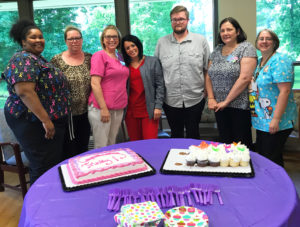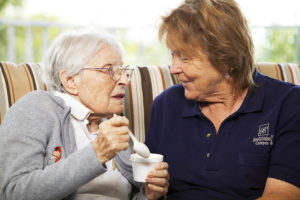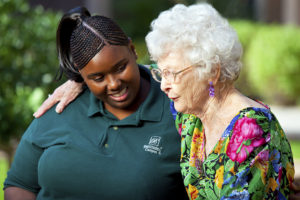Beatitudes Campus Partners with Horizon House, United Church Homes to Bring Comfort to Persons with Dementia

The staff of Trinity Community celebrates being accredited as a Comfort Matters community.
“What is the most rewarding is when you get someone comfortable and they tell you that they love you.”
These words, from a staff member at United Church of Christ-related Trinity Community — a United Church Homes senior living community in Beavercreek, Ohio — were expressed during a recent accreditation survey at the community as it became certified in the Comfort Matters program.
Comfort Matters was developed by the UCC’s Beatitudes Campus, a CHHSM member in Phoenix, in 2005. The program focuses on comfort to improve the quality of care and quality of life for persons with dementia by following five ideas: comfort care, anticipating residents’ needs, knowing the person, person-directed care, and staff empowerment.
“Comfort Matters not only helps staff learn and apply evidence-based practice, but it also helps organizations adapt their systems and routines to support comfort for persons with dementia,” says Tena Alonzo, director of education and research at Beatitudes. “Both steps are essential if we want to enhance quality of care and quality of life for persons with dementia.”
To date, the program has garnered praise both nationally and internationally. Within the UCC’s Council for Health and Human Service Ministries, the program has been adopted by Horizon House in Seattle and the United Church Homes family of communities. It is just one more way CHHSM members are living out the “love your neighbor” portion of the United Church of Christ’s 3 Great Loves initiative.
“Our plan is to implement the Comfort Matters program at all of our senior living communities,” says Amy Kotterman, director of hospitality services for United Church Homes. United Church Homes is the most recent CHHSM ministry to implement Comfort Matters. Along with Trinity, Chapel Hill Community in Canal Fulton, Ohio, has received accreditation. The other United Church Homes communities are all in the process of receiving training, which will be complete in 2019.
Kotterman says the Beatitudes Campus program simply is the best. “When we were evaluating various programs, we kept going back to the Beatitudes Comfort Matters program, as their mission, vision, and core values so closely resembled our own,” she says. “During trainings I often tell our staff, ‘Beatitudes “feels” like a sister community. Both of our organizations hold a deep belief in focusing on the person, individualized care, and meeting the needs of the whole person.’”
Although in the early stages of implementation, Comfort Matters has already shown results, Kotterman says.
“It has been inspiring to watch the growth and empowerment of our staff through implementing Comfort Matters at the communities,” she says. “The feeling of pride they are experiencing at helping the residents be ‘the best they can be’ and ‘living in the moment’ is uplifting.”
Evidence is Transformative at UCC’s Horizon House

Sometimes a small thing like an ice cream treat can make all the difference to a person with dementia.
Comfort Matters focuses on aggressive palliative measures to meet the physical, social, spiritual, and emotional needs of residents with late-stage dementia. It emphasizes knowing the whole person: their background, past and present routines, what makes them smile and brings them comfort, what foods they enjoy, what causes them discomfort.
Since implementing the program in 2015, Horizon House has seen significant transformations.
“Morning times are quieter and calmer as residents are getting up when they show an interest in starting their day, rather than responding to our 8 a.m. schedule of meal delivery,” says Lauri Warfield-Larson, health services officer. “The environment calls for less stimulation, an essential component for residents living with dementia.”
Other changes include altered bathing routines to promote comfort and calm, as well as the discontinuation of unnecessary medications. The increase in comfort has meant a significant reduction in Horizon House’s use of psychotropic drugs for the residents with dementia.
The Beatitudes program helps “organizations collect data which indicates comfort is in place, and we use that data to track their progress,” says Alonso. “The Comfort Matters data points include enhancing comfort and reducing reliance on antipsychotic and anxiolytic medications, reducing emergency department and hospitalization utilization, and rethinking supplement use.”
The improvement in comfort for residents at Horizon House also has triggered other changes.
“The number of residents who are reviewed for evidence of physical pain has grown … and more residents are receiving pharmacologic and non-pharmacologic measures” to increase comfort and a sense of well-being, Warfield-Larson says. “We utilize the program’s ‘I Care Plan’ tool that supports the unique needs for each resident. The caregivers contribute to these plans and staff is more relaxed and focused on what makes residents smile and feel comfortable.”
In the Comfort Matters program, the care is an interdisciplinary effort, with everyone from diet aids to housekeepers, nurses, nursing assistants, activity leaders, and managers all completing Comfort Matters training.
Partnership with Beatitudes Beneficial to All

Beatitudes staff member takes a walk with a resident.
“Ultimately, the Comfort Matters Dementia Care Education program wishes to change the way care and service is delivered to all people with dementia, no matter where they live,” says Alonzo. Partnerships with CHHSM ministries are helping to achieve that goal.
“Comfort Matters is an excellent program,” says Warfield-Larson. “A community must be willing to make the commitment to adhere to weekly staff meetings that are critical to achieving the desired outcomes. Staff is energized and empowered.”
But the good will goes both ways. Beatitudes, too, has benefited from developing the program and bringing it to other care partners.
“It takes a village to serve persons with dementia, and it takes the Beatitudes Campus to teach others about evidence-based, person-directed care,” says Alonzo. “Together we have been able to teach others, not only by teaching them in a classroom, but also by what we do.”
“We are grateful for one another, and the relationships which have been forged in our work,” she adds. “Ultimately we all share in the success of the program and our efforts to support persons living with dementia locally, nationally, and internationally.”
Join Our Mailing LIst
"*" indicates required fields
Follow on Facebook
Cedar Community and the West Bend Theatre Company Announce Partnership - CHHSM
www.chhsm.org
Cedar Community in West Bend, Wis., and the West Bend Theatre Company (WBTC) announce recently that they will continue their partnership in the 2025 season. Following a highly successful run of Char...